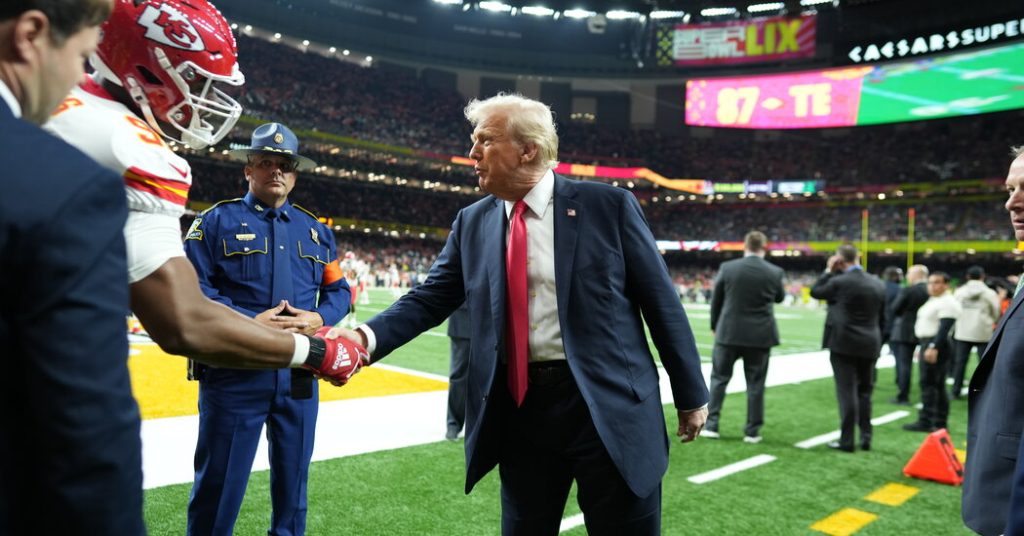President Trump’s Historic Visit to New Orleans and the Super Bowl
President Donald Trump made history on Sunday by becoming the first sitting U.S. president to attend a Super Bowl, bringing with him a mix of excitement, controversy, and policy announcements. The day began with a round of golf alongside legendary golfer Tiger Woods, where the two reportedly discussed a potential merger between the PGA Tour and the Saudi-backed LIV Golf circuit. The president’s visit to New Orleans was marked by both fanfare and criticism, as he used the platform to announce several significant decisions. On his way to the event, aboard Air Force One, Trump issued a proclamation declaring Sunday as “Gulf of America Day,” a symbolic gesture tied to his recent executive order renaming the Gulf of Mexico. This move, while largely ceremonial, sparked debate over its implications for the region and its potential impact on international relations.
A Day of Policy and Controversy
Before the Super Bowl even kicked off, President Trump made headlines with a series of bold policy announcements. He revealed plans to impose a 25 percent tariff on all foreign steel and aluminum imports, effective Monday, citing the need to protect American industries. This decision is likely to escalate trade tensions with other nations and could have ripple effects on the global economy. Additionally, Trump reiterated his intention to move forward with taking control of the Gaza Strip, a move that has raised eyebrows both domestically and internationally. He described the region as a “big real estate site” that the United States was “going to own,” a statement that has drawn criticism for its simplified and dismissive tone regarding a complex geopolitical issue.
Mixed Reactions at the Superdome
As President Trump arrived at the Superdome for the highly anticipated matchup between the Kansas City Chiefs and the Philadelphia Eagles, he was met with a mix of cheers and boos from the crowd. The president’s entourage included his son Eric Trump and Eric’s wife, Lara Trump, as well as his daughter Ivanka Trump. Several Republican leaders also accompanied him, adding to the political undertones of his visit. Among the other notable attendees was former First Lady Jill Biden, a vocal Eagles fan, who was present with her grandson, Hunter Biden’s son, Beau. Notably absent was President Joe Biden, whose security clearance Trump had revoked just days earlier. Trump’s presence at the event was a clear attempt to capitalize on the unifying spirit of the Super Bowl, though it also served as a reminder of the deep divisions he has faced during his presidency.
National Anthem and Pre-Game Remarks
Inside the Superdome, President Trump was seen standing for the national anthem and saluting, a moment that was captured by cameras and shared widely on social media. The president’s gestures were interpreted by some as an attempt to align himself with patriotic values, though critics argue that his actions often contradict the symbolism of such moments. In an interview with Fox News anchor Bret Baier that aired earlier in the day, Trump defended his decision to attend the Super Bowl, calling it a “good thing” for the country’s spirit, which he claimed had “taken on a whole new life” under his leadership. When asked about the game itself, Trump praised both teams’ quarterbacks but ultimately predicted a Kansas City Chiefs victory, citing Patrick Mahomes’ impressive record and noting that Mahomes’ wife, Brittany, was a “Trump fan.”
The Broader Implications of Trump’s Actions
The unfolding of former President Trump’s first three weeks in office has been anything but smooth. His tenure has been marked by widespread turmoil, both domestically and internationally. The announcement of tariffs on foreign steel and aluminum imports, coupled with his controversial remarks about the Gaza Strip, has left many questioning the administration’s approach to global relations and economic policy. Additionally, the revocation of President Biden’s security clearance has been viewed by some as a politically motivated move, further exacerbating tensions between the two leaders. Trump’s defenders argue that these actions are necessary to restore American strength and competitiveness, while critics warn that they could lead to unintended consequences, such as trade wars and international conflict.
A Day of Sports and Politics
Despite the controversies surrounding his visit, President Trump’s attendance at the Super Bowl served as a reminder of the enduring intersection of sports and politics in American culture. The event, often seen as a unifying moment for the nation, became a backdrop for the president’s latest moves, highlighting the polarization that has defined his time in office. Whether through the cheers of his supporters or the boos of his critics, Trump’s presence at the Super Bowl was a microcosm of the divided America he has often sought to address. As the game concluded and the Kansas City Chiefs celebrated their victory, the political landscape remained as contentious as ever, with Trump’s actions ensuring that his presidency would continue to dominate the headlines in the weeks and months to come.












